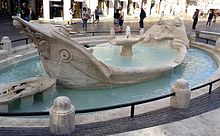| Revision as of 17:46, 8 November 2015 edit159.203.26.154 (talk)No edit summary← Previous edit | Revision as of 00:33, 23 January 2016 edit undoVargob (talk | contribs)432 editsNo edit summaryNext edit → | ||
| Line 7: | Line 7: | ||
| The shape was chosen because, prior to the river walls being built, the ] often flooded and in 1598 there was a particularly bad flooding and the Piazza di Spagna was flooded up to a metre. Once the water withdrew, a boat was left behind in the square.<ref>{{cite book|last=Rendina|first=Claudio|title=Enciclopedia di Roma|publisher=Newton & Compton|year=1999|location=Rome}}</ref> | The shape was chosen because, prior to the river walls being built, the ] often flooded and in 1598 there was a particularly bad flooding and the Piazza di Spagna was flooded up to a metre. Once the water withdrew, a boat was left behind in the square.<ref>{{cite book|last=Rendina|first=Claudio|title=Enciclopedia di Roma|publisher=Newton & Compton|year=1999|location=Rome}}</ref> | ||
| ⚫ | ] on the fountain has been carried out several times, the last being in 2014, through a private donation of €200,000. A few weeks after the unveiling, the fountain was damaged on 19 February 2015 by a group of ] ], who were in Rome to support ]-based club ] in a ] match against ]. The group, allegedly under the influence of alcohol and drugs,<ref></ref> stepped into the fountain and threw bottles and rubbish in it before clashing with the police. | ||
| ==In popular culture== | |||
| The English poet ] could hear the sound of the fountain's water flowing soothingly from his deathbed. He said it reminded him of lines from the 17th-century play ''], or Love Lies a-Bleeding'' (1611) and was the source for his ]: "Here lies one whose name was writ in water." | The English poet ] could hear the sound of the fountain's water flowing soothingly from his deathbed. He said it reminded him of lines from the 17th-century play ''], or Love Lies a-Bleeding'' (1611) and was the source for his ]: "Here lies one whose name was writ in water." | ||
| ] uses the fountain as a plot device in '']. | |||
| ⚫ | ] on the fountain has been carried out several times, the last being in 2014, through a private donation of €200,000. A few weeks after the unveiling, the fountain was damaged on 19 February 2015 by a group of ] ], who were in Rome to support ]-based club ] in a ] match against ]. The group, allegedly under the influence of alcohol and drugs,<ref></ref> stepped into the fountain and threw bottles and rubbish in it before clashing with the police. | ||
| ==References== | ==References== | ||
Revision as of 00:33, 23 January 2016


The Fontana della Barcaccia (Fountain of the Ugly Boat; Template:IPA-it) is a Baroque fresh-water fountain in Piazza di Spagna in Rome, the capital of Italy, just below the Spanish Steps. It is so named because it is in the shape of a half-sunken ship with water overflowing its bows. The fountain was commissioned by Pope Urban VIII and was completed in 1627 by Pietro Bernini and his son Gian Lorenzo Bernini.
The shape was chosen because, prior to the river walls being built, the Tiber often flooded and in 1598 there was a particularly bad flooding and the Piazza di Spagna was flooded up to a metre. Once the water withdrew, a boat was left behind in the square.
Restoration on the fountain has been carried out several times, the last being in 2014, through a private donation of €200,000. A few weeks after the unveiling, the fountain was damaged on 19 February 2015 by a group of football hooligans, who were in Rome to support Rotterdam-based club Feyenoord in a Europa League match against A.S. Roma. The group, allegedly under the influence of alcohol and drugs, stepped into the fountain and threw bottles and rubbish in it before clashing with the police.
In popular culture
The English poet John Keats could hear the sound of the fountain's water flowing soothingly from his deathbed. He said it reminded him of lines from the 17th-century play Philaster, or Love Lies a-Bleeding (1611) and was the source for his epitaph: "Here lies one whose name was writ in water."
Jess Walter uses the fountain as a plot device in Beautiful Ruins.
References
- Rendina, Claudio (1999). Enciclopedia di Roma. Rome: Newton & Compton.
- Ansa.it
External links
41°54′21″N 12°28′56.25″E / 41.90583°N 12.4822917°E / 41.90583; 12.4822917
This article about an Italian building or structure is a stub. You can help Misplaced Pages by expanding it. |